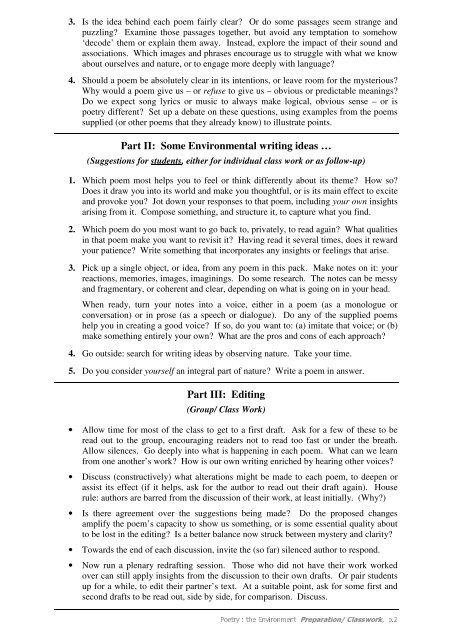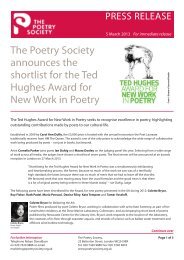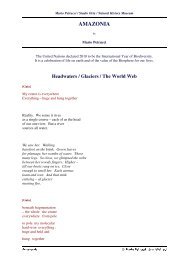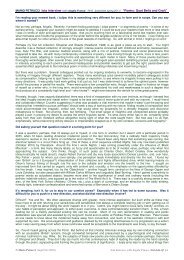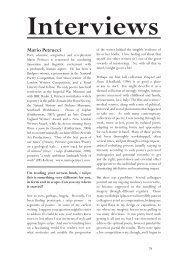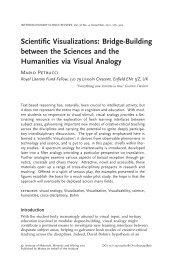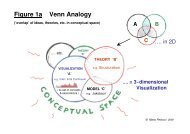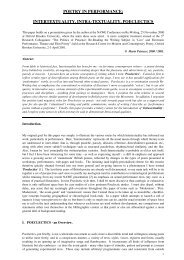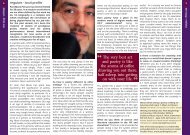You also want an ePaper? Increase the reach of your titles
YUMPU automatically turns print PDFs into web optimized ePapers that Google loves.
3. Is <strong>the</strong> idea behind each poem fairly clear? Or do some passages seem strange and<br />
puzzling? Examine those passages toge<strong>the</strong>r, but avoid any temptation to somehow<br />
‘decode’ <strong>the</strong>m or explain <strong>the</strong>m away. Instead, explore <strong>the</strong> impact of <strong>the</strong>ir sound and<br />
associations. Which images and phrases encourage us to struggle with what we know<br />
about ourselves and nature, or to engage more deeply with language?<br />
4. Should a poem be absolutely clear in its intentions, or leave room for <strong>the</strong> mysterious?<br />
Why would a poem give us – or refuse to give us – obvious or predictable meanings?<br />
Do we expect song lyrics or music to always make logical, obvious sense – or is<br />
poetry different? Set up a debate on <strong>the</strong>se questions, using examples from <strong>the</strong> poems<br />
supplied (or o<strong>the</strong>r poems that <strong>the</strong>y already know) to illustrate points.<br />
Part II: Some <strong>Environment</strong>al writing ideas …<br />
(Suggestions for students, ei<strong>the</strong>r for individual class work or as follow-up)<br />
1. Which poem most helps you to feel or think differently about its <strong>the</strong>me? How so?<br />
Does it draw you into its world and make you thoughtful, or is its main effect to excite<br />
and provoke you? Jot down your responses to that poem, including your own insights<br />
arising from it. Compose something, and structure it, to capture what you find.<br />
2. Which poem do you most want to go back to, privately, to read again? What qualities<br />
in that poem make you want to revisit it? Having read it several times, does it reward<br />
your patience? Write something that incorporates any insights or feelings that arise.<br />
3. Pick up a single object, or idea, from any poem in this pack. Make notes on it: your<br />
reactions, memories, images, imaginings. Do some research. The notes can be messy<br />
and fragmentary, or coherent and clear, depending on what is going on in your head.<br />
When ready, turn your notes into a voice, ei<strong>the</strong>r in a poem (as a monologue or<br />
conversation) or in prose (as a speech or dialogue). Do any of <strong>the</strong> supplied poems<br />
help you in creating a good voice? If so, do you want to: (a) imitate that voice; or (b)<br />
make something entirely your own? What are <strong>the</strong> pros and cons of each approach?<br />
4. Go outside: search for writing ideas by observing nature. Take your time.<br />
5. Do you consider yourself an integral part of nature? Write a poem in answer.<br />
Part III: Editing<br />
(Group/ Class Work)<br />
• Allow time for most of <strong>the</strong> class to get to a first draft. Ask for a few of <strong>the</strong>se to be<br />
read out to <strong>the</strong> group, encouraging readers not to read too fast or under <strong>the</strong> breath.<br />
Allow silences. Go deeply into what is happening in each poem. What can we learn<br />
from one ano<strong>the</strong>r’s work? How is our own writing enriched by hearing o<strong>the</strong>r voices?<br />
• Discuss (constructively) what alterations might be made to each poem, to deepen or<br />
assist its effect (if it helps, ask for <strong>the</strong> author to read out <strong>the</strong>ir draft again). House<br />
rule: authors are barred from <strong>the</strong> discussion of <strong>the</strong>ir work, at least initially. (Why?)<br />
• Is <strong>the</strong>re agreement over <strong>the</strong> suggestions being made? Do <strong>the</strong> proposed changes<br />
amplify <strong>the</strong> poem’s capacity to show us something, or is some essential quality about<br />
to be lost in <strong>the</strong> editing? Is a better balance now struck between mystery and clarity?<br />
• Towards <strong>the</strong> end of each discussion, invite <strong>the</strong> (so far) silenced author to respond.<br />
• Now run a plenary redrafting session. Those who did not have <strong>the</strong>ir work worked<br />
over can still apply insights from <strong>the</strong> discussion to <strong>the</strong>ir own drafts. Or pair students<br />
up for a while, to edit <strong>the</strong>ir partner’s text. At a suitable point, ask for some first and<br />
second drafts to be read out, side by side, for comparison. Discuss.


